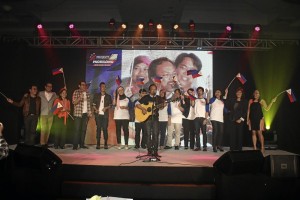
The ambassadors of Project Pagsulong and officials of partner organizations behind the P1-million youth entrepreneurship challenge sing along with singer/songwriter Noel Cabangon during the project launch.
What would you do to help bring down the level of poverty in the Philippines?
This was the challenge to young Filipinos raised by PLDT KaAsenso, PLDT-Smart Foundation, The Outstanding Students of the Philippines Alumni Community (TOSP-AC) and RFM Foundation during the launch of Project Pagsulong.
Project Pagsulong is a P1-million challenge to get young Filipino entrepreneurs 18-30 years old to formulate brilliant business ideas that will help reduce the level of poverty in the Philippines, where about three of 10 Filipinos are considered poor.
According to Patrick Tang, head of PLDT’s Home Marketing for Voice and Micro-business, the telecommunications giant has thrown its full support behind the project as it believes that social entrepreneurship is a powerful tool that can alleviate poverty in the Philippines.
Unlike the traditional entrepreneurship model where improving the bottom line is the primary objective, social entrepreneurship combines the efficiency of running a profitable business with the commitment to achieve lofty social goals.
In short, it is entrepreneurship with a social objective.
For social entrepreneurs, earning a profit is not the only and ultimate objective, for they are also in the business of meeting higher goals, such as environmental protection and income growth of rural communities.
Examples are Hapinoy and Rags2Riches, two of the leading social enterprises in the Philippines whose main movers are among the ambassadors of Project Pagsulong.
Hapinoy, founded by Bam Aquino and Mark Ruiz, seeks to improve the earnings of sari-sari store owners all over the country by providing them access to microfinancing and new business opportunities.
The aggregation of the sari-sari stores also creates a distribution channel to bring quality goods and services to the majority of Filipinos.
At the same time, the sari-sari store owners—most of whom are women—are provided with skills and information that they can use to make their operations more efficient and profitable.
On the other hand, Rags2Riches, headed by Reese Fernandez-Ruiz, has made a difference in the lives of women of Payatas, who now earn well from producing designer homeware and fashion accessories out of excess cloth provided by garment manufacturers.
Not only is Rags2Riches able to reuse scrap fabric that would have otherwise been thrown in the dumps, it is also in a position to provide its growing community of women a sustainable source of livelihood.
These are just two of the growing legion of Filipino social entrepreneurs who are proving that it is possible for businesses to earn and do good at the same time.
PLDT-Smart Foundation President Esther Santos said that through Project Pagsulong, more of these social entrepreneurship ideas from the youth will hopefully come to the fore.
“We believe in investing in our youth and their ability to take part in finding novel solutions to our social problems, some of which, in fact, were the same problems encountered by generations but have remained unsolved,” Santos added.
“We want to promote youth-preneurship and take it a notch higher by providing an opportunity for them to make their entrepreneurial ideas a reality, and at the same time become social movers,” said Tang.
Project Pagsulong is open to teams of three to five young adults, 18-30-years old from all over the country.
The business ideas that address social issues will be judged based on social impact, innovation, feasibility, team management and community participation.
The deadline for submission of entries is Aug. 31, 2012, after which the entries will be whittled down to four winning ideas.
The best business idea will get a cash grant of P500,000; second prize, P300,000; third prize, P200,000; and then P100,000 will go to the People’s Choice Award based on online voting.
Tang said the difference between Project Pagsulong and other youth entrepreneurship awards is that the project will see the social entrepreneurship concepts through from idea to execution.
The plan is to see the ideas come to life and the project proponents believe that the Filipino youth is more than capable of rising to the challenge to help make poverty history.

